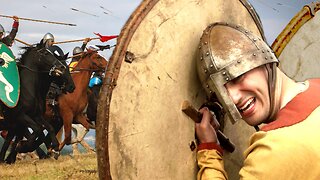Premium Only Content

P1 |The ink of the scholar is more sacred than the blood of the martyr | How sound is this hadeeth
@islamichistory813 #IslamicWisdom #HadeethExplained #ScholarshipAndSacrifice
Part-1 “The ink of the scholar is more sacred than the blood of the martyr” How sound is this hadeeth?
Asslamoalaikum sisters brothers friends and elders We are describing In this islamic informative and educational video, we delve into the significance of the famous hadeeth that states, "The ink of the scholar is more sacred than the blood of the martyr."
The answer, interpretation, implications, will be described into two parts, so please be with us upto end of both part of this video.
The hadeeths which state that the scholars are superior to the martyrs, or that the ink of the scholar is superior to the blood of the martyr, were narrated from a number of the Sahaabah, but they have weak and flimsy, or fabricated isnaads, which we will mention here in brief:
1. From Abu’d-Darda’ (may Allah be pleased with him):
It was narrated by Ibn ‘Abd al-Barr in Jaami‘ Bayaan al-‘Ilm (1/150). His isnaad includes Ismaa‘eel ibn Abi Ziyaad, of whom Ibn Hibbaan said: He is a charlatan. Hence al-‘Iraqi classed it as da‘eef in Takhreej al-Ihya’, p. 5
2. From ‘Abdullah ibn ‘Amr ibn al-‘Aas (may Allah be pleased with him).
It was narrated by Abu Na‘eem in Akhbaar Asbahaan (1718) and ad-Daylami in Musnad al-Firdaws. Its isnaad also includes Ismaa‘eel ibn Abi Ziyaad, who is mentioned above.
It was also narrated by Ibn al-Jawzi in al-‘Ilal al-Mutanaahiyah (1/81) via another isnaad. He said: This is not saheeh. Ahmad ibn Hanbal said: Muhammad ibn Yazeed al-Waasiti did not narrate anything from ‘Abd ar-Rahmaan ibn Ziyaad. Ibn Hibbaan said: He narrates fabricated reports from trustworthy narrators. End quote.
3. From Ibn ‘Umar (may Allah be pleased with him)
It was narrated by ad-Daylami in Musnad al-Firdaws. Its isnaad includes Ishaaq ibn al-Qaasim and his father, who are not known.
It was also narrated by al-Khateeb in Tareekh Baghdaad (2/193) and via him by Ibn al-Jawzi in al-‘Ilal al-Mutanaahiyah (1/80). He said: This hadeeth is not soundly narrated from the Messenger of Allah (blessings and peace of Allah be upon him). al-Khateeb said: Its men are all trustworthy apart from Muhammad ibn al-Hasan, and we think that it is something that he made up. End quote.
4. From an-Nu‘maan ibn Basheer (may Allah be pleased with him)
It was narrated by as-Sahami in Tareekh Jarjaan (p. 91, 222), and by Ibn al-Jazwi in al-‘Ilal al-Mutanaahiyah (1/81). He said: This is not saheeh. As for Haroon ibn ‘Antarah, Ibn Hibbaan said: It is not permissible to quote him as evidence; he narrated such odd (munkar) reports that one cannot help thinking that he is the one who fabricated them. And Ya‘qoob al-Qummi is da‘eef. End quote.
5. From ‘Uqbah ibn ‘Aamir (may Allah be pleased with him)
It was narrated by ar-Raafa‘i in Tareekh Qizween (3/481). Its isnaad includes ‘Abd al-Malik ibn Maslamah, who narrated odd (munkar) reports. It also includes ‘Abdullah ibn Luhay‘ah.
6. From ‘Imraan ibn Husayn (may Allah be pleased with him)
It was narrated by al-Marhabi in Fadl al-‘Ilm – as was narrated by as-Suyooti in ad-Durr al-Manthoor (3/423); it is also narrated in Juz’ Ibn ‘Amashleeq (p. 44) with the same isnaad, which includes Ahmad ibn Muhammad ibn al-Qaasim, the mu’adhdhin of Tarsoos, for whom I could not find any biography.
7. From Anas ibn Maalik (may Allah be pleased with him)
It was narrated by Ibn an-Najjaar from him, as was mentioned by as-Suyooti. It is also mentioned in Lisaan al-Mizaan (5/225) via Jarraab al-Kadhdhaab (the liar).
8. From Ibn ‘Abbaas (may Allah be pleased with him)
It was narrated in Juz’ Ibn ‘Amashleeq (p. 45) via al-Kalbi from Abu Saalih from Ibn ‘Abbaas; this is a waahin (flimsy) isnaad.
9. From Abu Hurayrah (may Allah be pleased with him)
It was narrated by as-Sam‘aani in Adab al-Imla’ wa’l-Istimla’ (p. 181). Its isnaad includes al-Muzaffar ibn al-Husayn, the shaykh of as-Sam‘aani, for whom I could not find any biography.
To sum up, the hadeeth is not saheeh. Al-Khateeb al-Baghdaadi said concerning it: It is mawdoo‘ (fabricated). Imam adh-Dhahabi (may Allah have mercy on him) said: Its text is fabricated. End quote from Mizaan al-I‘tidaal (3/517). Ash-Shawkaani mentioned it in al-Fawaa’id al-Majmoo‘ah (p. 17), and al-‘Aamiri mentioned it in al-Jadd al-Hatheeth fi Bayaan ma laysa bi Hadeeth (p. 203). Shaykh al-Albaani said in as-Silsilah ad-Da‘eefah (hadeeth no. 4832): This verdict (i.e., that it is fabricated) is what one feels comfortable with. End quote. Shaykh Muhammad Rasheed Rida said something similar in Majallat al-Manaar (3/698).
so friends tomorow inshaAllah we will be described its second part. Allah Hafiz
=========================================
-
 45:39
45:39
Survive History
11 hours ago $2.17 earnedCould You Survive in the Shield Wall at the Battle of Hastings?
14.6K5 -
 1:50:28
1:50:28
TheDozenPodcast
9 hours agoViolence, Abuse, Jail, Reform: Michael Maisey
54.3K2 -
 23:01
23:01
Mrgunsngear
1 day ago $0.68 earnedWolfpack Armory AW15 MK5 AR-15 Review 🇺🇸
54.5K12 -
 25:59
25:59
TampaAerialMedia
1 day ago $1.31 earnedUpdate ANNA MARIA ISLAND 2025
30.8K3 -
 59:31
59:31
Squaring The Circle, A Randall Carlson Podcast
11 hours ago#039: How Politics & War, Art & Science Shape Our World; A Cultural Commentary From Randall Carlson
23.9K2 -
 13:21
13:21
Misha Petrov
11 hours agoThe CRINGIEST Thing I Have Ever Seen…
19.3K41 -
 11:45
11:45
BIG NEM
7 hours agoWe Blind Taste Tested the Best Jollof in Toronto 🇳🇬🇬🇭
12.7K -
 15:40
15:40
Fit'n Fire
11 hours ago $0.20 earnedArsenal SLR106f & LiteRaider AK Handguard from 1791 Industries
11.1K1 -
 8:34
8:34
Mike Rowe
6 days agoWhat You Didn't Hear At Pete's Confirmation Hearing | The Way I Heard It with Mike Rowe
48.9K20 -
 7:13:44
7:13:44
TonYGaMinG
12 hours ago🟢LATEST! KINGDOM COME DELIVERANCE 2 / NEW EMOTES / BLERPS #RumbleGaming
70.3K4